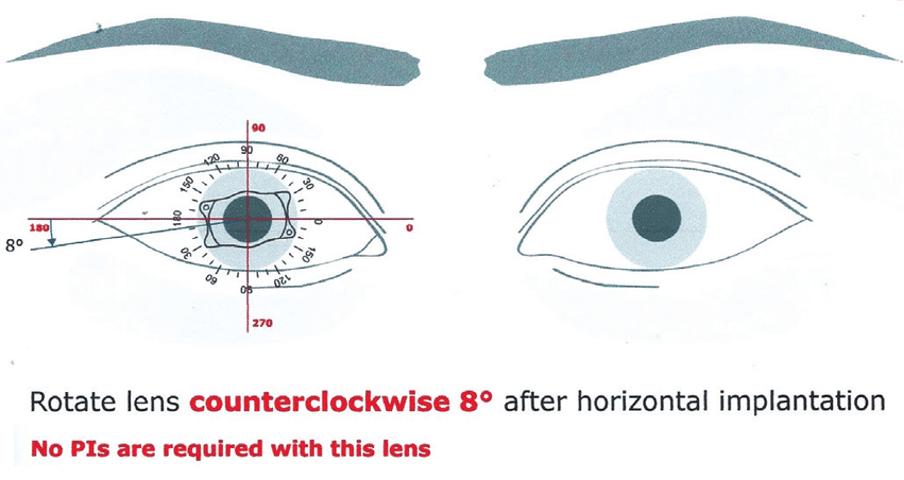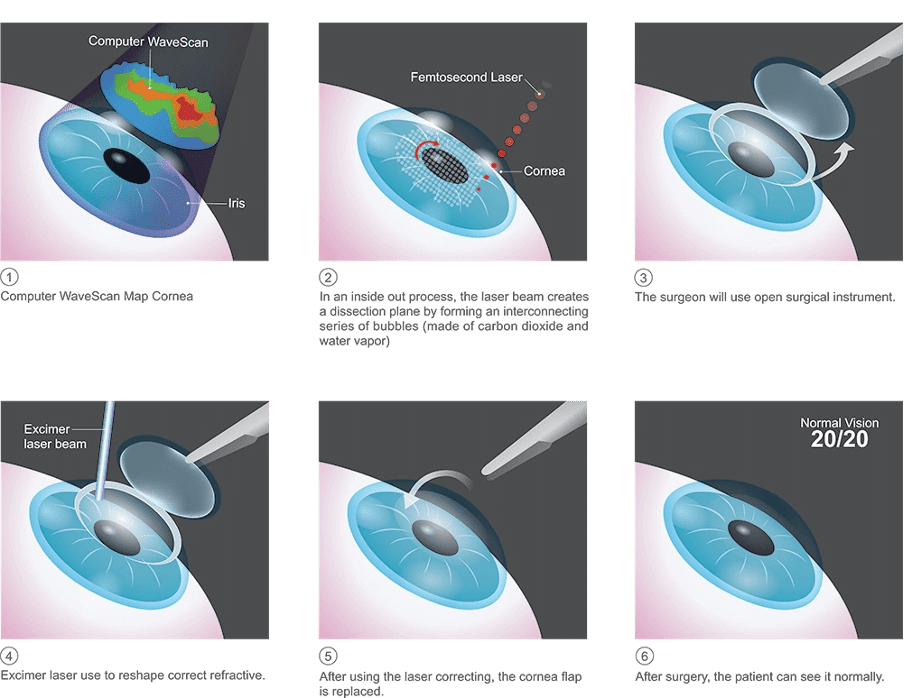Implantable contact lenses reshape the scene of vision correction. Over 95% of patients report life-changing results. These innovative lenses go inside your eye through a quick procedure that takes just 30 minutes. Patients see better right away.
These permanent contact lenses work as soft, flexible devices that sit behind your iris and in front of your natural lens. They work best for people with severe short-sightedness or long-sightedness. Many patients’ vision becomes clearer than with glasses. The cost ranges from £3,650 to £4,850 per eye in the UK. This makes them a smart investment for your vision. Experienced surgeons make these lenses safe to use. The best part? You can remove the lens through the same small cut if needed.
Our expert surgeons at Precision Vision London will help you understand everything about this advanced vision correction option in this piece. We cover who qualifies, what to expect during recovery, and the results you can achieve long-term.
What are implantable contact lenses and how do they work?

Image Source: ResearchGate
Implantable contact lenses (ICLs) provide a lasting solution for vision correction that works differently from regular eyewear options. These innovative lenses give patients freedom from daily glasses or contact lenses, particularly those with stronger prescriptions.
How ICLs differ from traditional contact lenses
Regular contact lenses rest on your eye’s surface, but implantable contact lenses are surgically placed inside your eye. You’ll never need to clean, remove, or replace them like traditional contacts.
ICLs serve as an ‘additive’ treatment because the procedure doesn’t remove any tissue. This makes them different from laser eye surgery and gives patients a reversible option. Patients rarely experience the dryness or discomfort that external contact lenses might cause.
Where the lens is placed in the eye
Your surgeon will position the implantable lens behind your iris (the eye’s coloured part) and in front of your natural crystalline lens. Medical professionals call this location the “posterior chamber” of the eye. The flexible lens slides through a small incision and rests comfortably in this space. The lens becomes undetectable – you can’t see or feel it. The quick procedure takes just 20-30 minutes.
Types of implantable lenses used in the UK

EVO ICL stands as the most common implantable contact lens. This modern lens uses Collamer, a biocompatible material that combines collagen and polymer. The material’s properties make it:
- Lighter than other lens types
- Hydrophilic (able to mix with water)
- Better at allowing gases and nutrients to pass through
EVO ICL’s design features a tiny hole in the middle, which eliminates the need for a laser iridotomy procedure that older versions required. The lens protects your eyes from UV rays.
These implantable lenses correct various vision problems like nearsightedness (myopia), farsightedness (hyperopia), and astigmatism. Precision Vision London recommends ICLs for prescriptions up to -18.00D for short-sightedness, +10.00D for long-sightedness, and up to ±4.50D of astigmatism.
Who is a good candidate for ICL surgery?
You’ll need a full picture of several factors to know if implantable contact lenses suit you. Precision Vision London’s detailed evaluation process will give a perfect outcome for every patient. Additionally, if you have a high degree of refractive error or have previously undergone laser eye surgery without satisfactory results, ICLs may provide a viable solution. Consulting with our experienced eye care professional will help determine the best course of action tailored to your specific needs.

Age and prescription requirements
The sweet spot for implantable contact lens candidates usually falls between 21 and 45 years. Doctors recommend this age range because vision stays more stable during these years. Your prescription should stay the same for at least 12 months, which suggests your vision has settled.
These lenses can fix the following vision problems:
- Short-sightedness (myopia) up to -18.00D
- Long-sightedness (hyperopia) up to +10.00D
- Astigmatism up to ±4.50D
The largest longitudinal study shows permanent contact lenses are a great way to get results for patients with higher prescriptions who might have few other choices.
When ICL is preferred over laser surgery
Permanent contact lenses become the best option for many patients based on their eye’s characteristics. These lenses work great as an alternative if you have thin corneas since they don’t need corneal tissue removal.
ICL surgery is nowhere near as risky for people who have existing cornea or eye surface issues. People who worry about dry eyes will be glad to know that implantable contact lenses usually don’t make this condition worse. Life without glasses or contact lenses awaits! Book your ICL consultation with our top London eye surgeons at Precision Vision London today!
Conditions that may disqualify a patient
Not everyone makes an ideal candidate for implantable contact lenses. Factors such as the overall health of your eyes, previous eye surgeries, and specific lifestyle considerations can influence eligibility. It’s crucial to have an in-depth discussion with your eye care professional to explore all potential risks and benefits tailored to your situation. Here’s what might make this procedure unsuitable:
- Eye conditions such as cataracts, glaucoma, or recurrent inflammation
- Pregnancy or breastfeeding, since hormonal changes affect vision stability
- Chronic dry eye or keratoconus
- Not enough anterior chamber depth (the space where the lens sits)
ICL brings remarkable benefits, but getting a full picture from experienced surgeons at Precision Vision London helps determine if this vision correction method matches your specific needs. This personalised approach ensures you get the most suitable recommendation for your eye’s unique characteristics.
What to expect before, during and after the procedure

Image Source: Eye Physician Associates
The experience of getting implantable contact lenses involves several well-laid-out stages. Precision Vision London’s expert surgical team carefully manages each step of the process.
Original consultation and eye assessments
Your experience starts with a complete eye examination. Our specialists check your prescription and take exact measurements of your eye’s shape, size, and refractive error. You should stop wearing contact lenses two weeks before this assessment. The team will use special drops to dilate your pupils and get a full picture of your retina. Our consultants review your medical history to understand any conditions that could affect your surgery.
Step-by-step breakdown of the surgery
Your eyes will be numbed with anaesthetic drops on surgery day. We can provide mild sedation to make you more comfortable if needed. The surgeon makes a small keyhole cut (2-3mm) at your cornea’s edge. A special delivery device folds and inserts the implantable contact lens through this tiny opening. The lens sits behind your iris and in front of your natural lens, where it naturally unfolds into position. Each eye takes about 20-30 minutes to complete.
Recovery timeline and aftercare instructions
Most patients see better within hours after surgery, and vision fully returns in a couple of days. Recovery happens quickly – you can usually go back to work the next day. You’ll need eye drops to prevent inflammation and infection. Keep taking them for several weeks as prescribed.
To heal properly:
- Stay away from swimming and heavy exercise for two weeks
- Don’t wear eye makeup for at least two weeks
- Use protective sunglasses outdoors
- Keep your eyes dry for the first 48 hours
Common short-term side effects
You might feel mild discomfort and notice blurry vision and light sensitivity at first. Some patients see halos around lights, especially when it’s dark. These effects usually don’t last long and go away within days as your eyes adjust to their new lenses.
Benefits and risks of permanent contact lenses
Permanent contact lenses come with many benefits that you should think over carefully. Our specialists at Precision Vision London make sure you understand everything about this advanced vision correction option.

Advantages over glasses and laser surgery
Implantable contact lenses deliver exceptional visual quality, which often beats what glasses or traditional contacts can do. These lenses are a great way to get results for patients who have high prescriptions that laser surgery can’t handle. These lenses preserve your corneal tissue, unlike laser procedures, which makes them perfect for patients with thin corneas. They also cut down the risk of dry eye syndrome that often shows up after laser treatments.
The biocompatible material comes with built-in UV protection that might lower your risk of eye conditions like cataracts and macular degeneration. Patients usually see well at night with barely any glare or halos.
Are implantable contact lenses safe?
Studies show nearly 95% of patients feel satisfied or very satisfied with their results. Doctors have documented the safety of implantable contact lenses for almost three decades.
Your safety comes first at Precision Vision London. Every surgery carries some risk, but complications rarely happen. The risks often depend on things like your eye health and your surgeon’s expertise.
Potential side effects and how they are managed
You might experience temporary effects like light sensitivity, mild discomfort, and blurry vision during your original recovery period. These usually clear up within days if you follow proper aftercare.
Serious complications don’t happen often but might include increased eye pressure, infection, or inflammation. Our specialists give you antibiotic and anti-inflammatory drops to keep these risks low. Regular checkups help us spot and fix any issues quickly.
How long do implantable contact lenses last?
Your implantable contact lenses should last indefinitely. They’re made from biocompatible materials that stay safe in your eye without causing problems. The lenses stay strong, but your vision might change as time passes. You might find it harder to read small print after age 45 due to presbyopia, which happens naturally as we age. All the same, you won’t need new implants unless your prescription changes by a lot or you develop cataracts later in life.
Conclusion
Final thoughts on implantable contact lenses
Implantable contact lenses mark a breakthrough in vision correction technology that frees you from traditional glasses and contact lenses. These innovative lenses give exceptional visual quality and eliminate the daily maintenance that comes with conventional solutions.
The 95% satisfaction rate among ICL patients in the UK proves their effectiveness, especially when you have high prescriptions that other correction methods can’t address well. Without doubt, this procedure’s reversible nature gives peace of mind since your natural lens stays untouched and doctors can remove the implant if needed. Want to live without glasses or contact lenses? Book your ICL consultation with our top London eye surgeons at Precision Vision London today!
You can return to your daily activities quickly after a swift recovery period. Your vision stays clear for years due to the ICL’s durability. These lenses are a great option for patients worried about dry eye syndrome – a common side effect of laser procedures.
Clear vision needs the expertise and personal care that only specialists provide. Precision Vision London’s surgeons blend years of expertise with modern technology to improve your quality of life. ICLs are a safe, effective solution that will change your life – discuss your options with qualified professionals today.
FAQs
Q1. What are the potential risks of ICL surgery? While ICL surgery is generally safe, there are rare risks including infection, cataract formation, and increased eye pressure. However, these complications are uncommon and can be managed effectively with proper care and follow-up.
Q2. Who is an ideal candidate for ICL surgery in London? Ideal candidates for ICL surgery are typically between 21-45 years old with stable vision. The procedure is suitable for correcting myopia up to -18.00D, hyperopia up to +10.00D, and astigmatism up to ±4.50D. It’s particularly beneficial for those with high prescriptions or thin corneas.
Q3. How long do implantable contact lenses last? Implantable contact lenses are designed to last indefinitely. Made from biocompatible materials, they can safely remain in your eye without causing harm or irritation. However, your natural vision may change over time, particularly after age 45 due to presbyopia.
Q4. What is the recovery process like after ICL surgery? Most patients experience improved vision within hours of the procedure, with full restoration in a couple of days. You can typically return to work the day after surgery. However, it may take a few months for your vision to fully stabilise, during which time you might experience some fluctuations.
Q5. How does ICL surgery compare to other vision correction methods? ICL surgery offers several advantages over glasses, contact lenses, and laser surgery. It provides exceptional visual quality, is reversible, doesn’t remove corneal tissue, and reduces the risk of dry eye syndrome. It’s particularly beneficial for those with high prescriptions or thin corneas who may not be suitable candidates for laser surgery.
Authors & Reviewer
-
 Olivia: Author
Olivia: AuthorHi, I'm Olivia, a passionate writer specialising in eye care, vision health, and the latest advancements in optometry. I strive to craft informative and engaging articles that help readers make informed decisions about their eye health. With a keen eye for detail and a commitment to delivering accurate, research-backed content, I aim to educate and inspire through every piece I write.
-
 Dr. CT Pillai: Reviewer
Dr. CT Pillai: ReviewerDr. CT Pillai is a globally recognised ophthalmologist with over 30 years of experience, specialising in refractive surgery and general ophthalmology. Renowned for performing over 50,000 successful laser procedures.

